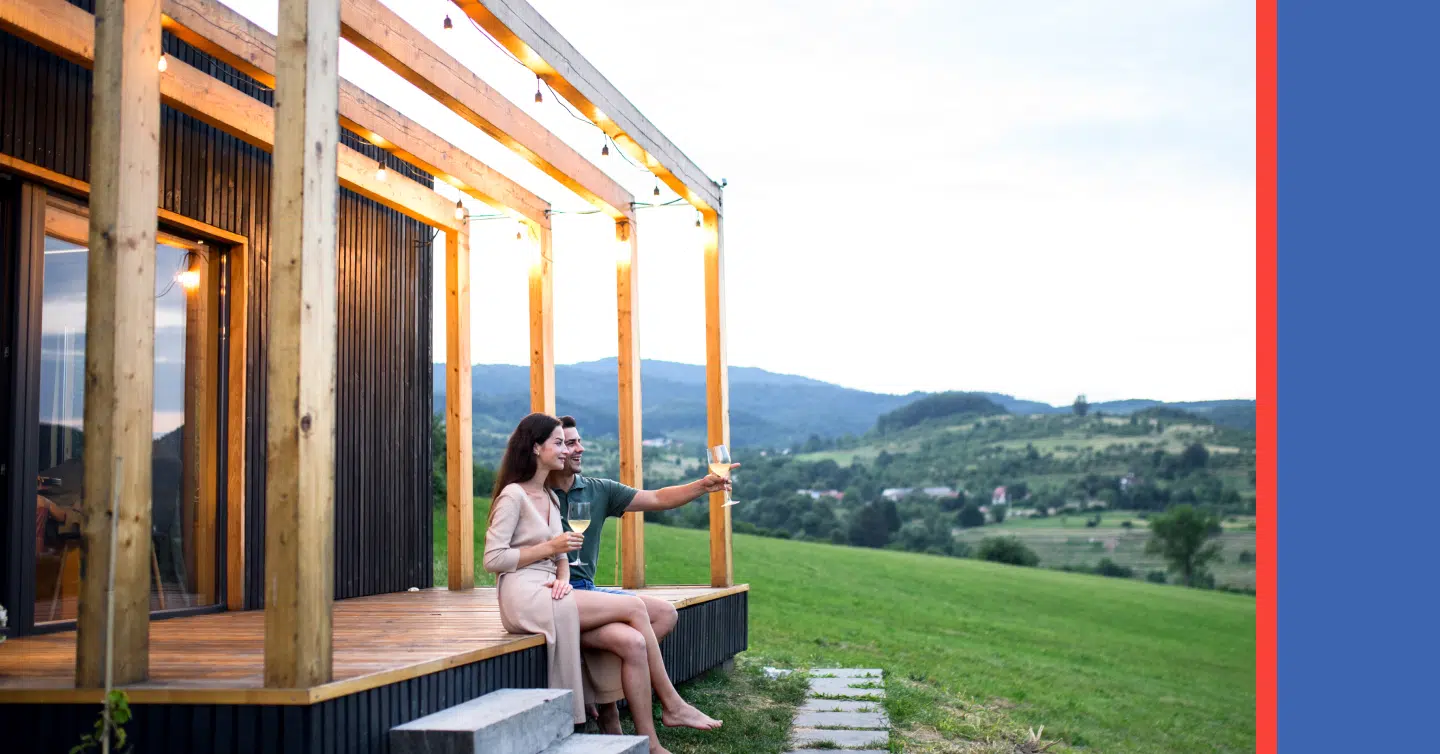How to Get a Second Home Mortgage in Canada

Table of contents
Many Canadians dream of owning a second home, whether a cozy cottage on a lake, a condo in the heart of a city, or an investment property to generate income. If you’re buying a second home to use as a quiet getaway or a savvy investor eyeing lucrative opportunities, understanding how to secure a second home mortgage is your first step toward making that dream a reality.
Key Takeaways
- A second home mortgage allows you to buy a second property, like a vacation home or investment property.
- A second home mortgage applies to an additional property purchased, while second mortgages are secured against the equity in a home already mortgaged.
- Second homes will be subject to capital gains tax when sold as they are not considered primary residences.
What Is a Second Home Mortgage?
A second home mortgage is a loan used to finance the purchase of a property other than your primary residence. This can include various property types, including vacation homes, secondary residences, or seasonal properties. Unlike investment properties, a second home is intended to be owner-occupied, meaning you or your family occupy the home rent-free for at least some of the year.
Obtaining a mortgage on a second home follows the same qualifying rules as your primary residence as long as you intend to occupy the home. If you have no plans to occupy the second home, it will be considered an investment property and will have stricter lending criteria than a mortgage for a second home you intend to occupy.
Reasons for Buying a Second Home
There are many reasons why you might be considering a second home.
- A vacation home
- A home if you work in a different city than your primary residence
- For your child to live while attending college or university
- For extended family members like aging parents
- As a future retirement home
- As an investment property
Mortgage and Downpayment Rules for Buying a Second Home
When securing a mortgage for a second home, the qualifying criteria may differ slightly from your primary residence depending on the property type and the intended use.
Year-round vacation (“Type A”) and second homes will follow the same lending criteria and can be financed similarly to your primary residence. Insured mortgages will require a minimum 5% downpayment, depending on the purchase price, and uninsured mortgages will require a minimum 20% downpayment.
You will also be required to show sufficient income through acceptable debt-to-income ratios to cover all debts, including the carrying costs of your primary residence. Depending on the lender, interest rates may be slightly higher for second homes as there is a higher risk of default since borrowers are more likely to maintain payments on their primary residence than a second home when facing financial difficulties.
Seasonal properties (“Type B”) or properties that cannot be used or accessed year-round will have much the same qualifying criteria as Type A properties with a few exceptions. For this type of second property, you will require a minimum downpayment of 10%.
Interest rates may be higher due to the potential risk of Type B seasonal properties being more challenging to sell or maintain value. Depending on the lender or default insurer, this type of property may have a maximum loan amount of $350,000, requiring you to make up any difference in purchase price with your downpayment.
Investment properties or those used to generate income require a minimum 20% downpayment. Investment properties typically have higher interest rates, as borrowers are more likely to maintain payments on their primary residence than on an investment property when money is tight. To qualify, some lenders will consider 50% of the value from market rent reports to ensure the property is cashflow positive. With or without consideration of rental income, your total debt service ratios must meet the lender’s guidelines.
Want to save thousands of
dollars on your renewal?
Renew with nesto and you can.
Types of Homes That Qualify for a Second Home Mortgage
The type of home and intended use will determine the qualifying rules for mortgages for second homes. Second homes can fall into the following categories:
Vacation Home
Vacation homes are typically used for recreational purposes, like weekend getaways or extended vacations, and are not occupied full-time. These properties are winterized or can be used year-round and classified as Type A secondary homes with lenders.
Requirements: To be considered a Type A vacation home, it must have full year-round access and be fully winterized. It can be zoned residential, rural, or seasonal. It must also have a permanent heat source, such as forced air or baseboard, and the water must be drinkable. The water source must be a well, municipal serviced or cistern. Lake water intake may be acceptable to the lender, provided the property has its own filtration system. There must also be a kitchen and a 3-piece bathroom. Additionally, the property must have a permanent foundation installed below the frost line.
Second Residences
Second residences are second homes that may serve as a primary residence for a portion of the year, such as a home used during the workweek. These properties can be homes, townhomes, or condos purchased to accommodate work-related relocations or reduce commutes while maintaining a primary residence elsewhere. They may also be purchased for a child to live in while attending college or university or for family members to live in.
Requirements: Second residences will follow the same criteria as primary residences. If the home is purchased for your child to live in, they must live in the home rent-free. If the home is purchased for a family member, they must also live in the home rent-free and be considered next of kin. Lenders may impose restrictions for distance from your primary residence.
Seasonal Properties
Some vacation homes are designated for seasonal use, meaning they are not winterized or cannot be accessed or lived in year-round. These types of second properties are classified as Type B with lenders.
Requirements: Type B properties follow many of the same requirements as Type A properties, with a few exceptions. They do not require a permanent heat source but must have a potable water source. The foundation can be floating (sitting on blocks), and the property can be accessible only by boat. Type B properties should not be confused with mobile homes, which require a chattel mortgage and may not require title to the land where they sit.
Investment Properties
If your second property is purchased to generate income, it will be classified as an investment property. These properties cover anything from single-family homes to townhomes and condos purchased to be rented out to either family or non-family tenants where you will collect rent.
Requirements: Investment properties carry higher risks than vacation or second properties, and as an uninsured purchase, the lender will require a higher downpayment of 20% or more. Your debt service ratios must meet lender guidelines to secure financing. Some lenders will consider 50% of the value from market rent reports to see if the property will be cashflow positive.
Second Home Mortgage vs Second Mortgage
It’s important to distinguish between a mortgage for a second home and a second mortgage. A second home mortgage is a loan used to finance the purchase of an additional property. A second mortgage is a loan secured against the equity in a property that already has a mortgage.
Understanding Second Home Mortgages
A second home mortgage is typically used to finance the purchase of a second residence or vacation home intended for personal use. However, it can also apply to investment properties. This mortgage is separate from the one on your primary residence or any other properties you may own and covers an entirely different property.
Understanding Second Mortgages
A second mortgage is a loan taken out on a property that already has a mortgage. It is often used to tap into the home’s equity and is second behind your first mortgage. Second mortgages can fund home improvements, consolidate debts, or pay for other expenses.
Second mortgages are placed on property with a mortgage, putting them “second” to the primary or first mortgage. In the event of foreclosure, these mortgages would be paid after the first mortgage.
How to Get a Mortgage for a Second Home
Securing a mortgage for a second home involves much the same process as getting a mortgage for your primary residence. However, additional information may be required to satisfy the lender’s requirements if the second home will be used for investment purposes.
- Assess your finances: Carefully evaluate your income, assets, credit score, and debt-to-income ratios to determine your borrowing capacity and ensure you can comfortably afford the additional financial obligations of a second property.
- Determine your downpayment: Depending on the property type and whether you will use the property for personal use or to generate income; you may be required to make a larger downpayment for a second home.
- Shop for lenders: Research and compare mortgage offers from various lenders, paying close attention to interest rates, fees, and lending requirements. When purchasing an investment property, the lender’s rental premium attached to the uninsured rate will vary based on their funding costs.
- Obtain preapproval/prequalification: Securing a preapproval or a prequalification from a lender will help you assess what you can reasonably afford for a second property.
- Obtain approval: Once you have found a property, be prepared to provide all documentation, including income statements, income tax returns, and details on your existing property and mortgage. Lenders will assess your ability to manage the additional debt to ensure you can maintain mortgage payments on both properties.
- Finalize the mortgage: Once approved, you must complete the necessary legal and financial paperwork to finalize the purchase and set up the mortgage on your second home.
Frequently Asked Questions
What is a second home mortgage?
A second home mortgage is a loan used to finance the purchase of an additional property other than your principal residence. This property can be used as a vacation home, a second residence if you or your spouse/child must commute long distances for work/school, or an investment property to generate income.
How much downpayment is required for a second home mortgage?
The downpayment you will require for a second home depends on the property type purchased. If the property is a year-round vacation home or second residence, you will need a minimum 5% downpayment. Seasonal properties that cannot be accessed year-round require a minimum 10% downpayment. Investment properties will require a minimum 20% downpayment.
What are the eligibility criteria for a second home mortgage?
To qualify for a second home mortgage, lenders will evaluate your financial situation, including your income, credit score, and debt-to-income ratios. You must demonstrate that you can manage and carry the additional financial obligations of maintaining another property.
Can I get a second home mortgage for an investment property?
You can get a second home mortgage for an investment property. However, you will be required to put down at least 20% as a downpayment and may need to meet stricter lending criteria than if you were using the property as a vacation or second home.
Are there tax implications for owning a second home?
Owning a second home has tax implications since it is not considered your primary residence. When sold, any home not considered your primary residence will be subject to capital gains tax. The portion that will be taxable is then added to your taxable income, which could place you in a higher tax bracket.
Additionally, if the second home is used to generate income, you will need to report any rental income on your tax return for the year. However, you can claim certain expenses with rental properties that can offset some of the income generated.
Final Thoughts
Purchasing a second home can be a great investment opportunity that helps you create long-lasting memories, reduce your commute, provide stable housing for your children or family members, or generate income. Whether for leisure, family needs, or investment purposes, understanding the types of properties typical of second home purchases can help you successfully budget and navigate the different mortgage requirements necessary to purchase your next property.
Consult an experienced mortgage expert at nesto to see if a second home fits your goals and finances.
Why Choose nesto
At nesto, our commission-free mortgage experts, certified in multiple provinces, provide exceptional advice and service that exceeds industry standards. Our mortgage experts are non-commissioned, salaried employees who provide impartial guidance on mortgage options tailored to your needs and are evaluated based on client satisfaction and advice quality. nesto aims to transform the mortgage industry by providing honest advice and competitive rates using a 100% fully digital, transparent, seamless process.
nesto is on a mission to offer a positive, empowering and transparent property financing experience – simplified from start to finish.
Contact our licensed and knowledgeable mortgage experts to find your best mortgage rate in Canada.
Ready to get started?
In just a few clicks, you can see our current rates. Then apply for your mortgage online in minutes!















